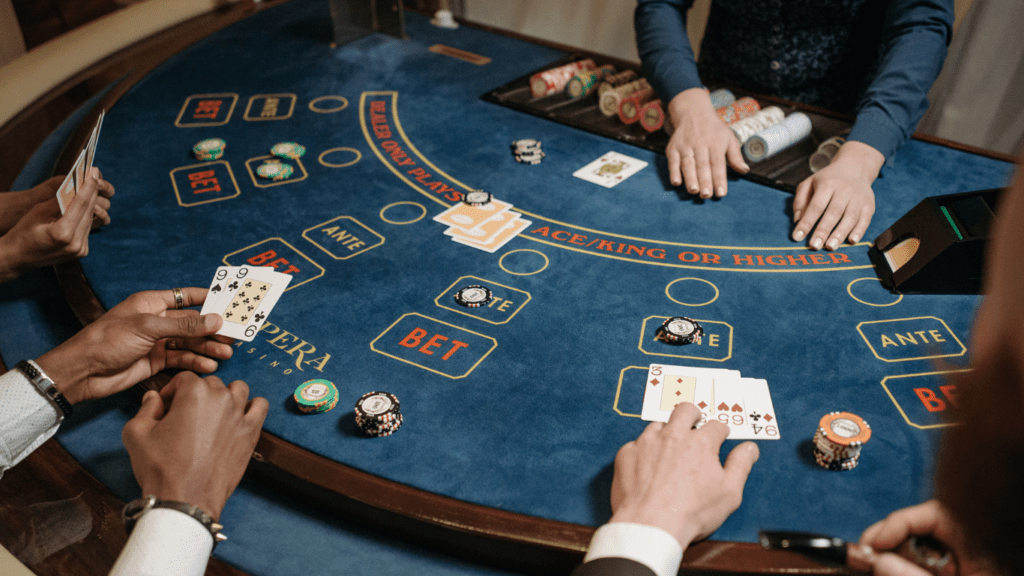Understanding Casino Betting
Casino betting involves more than just wagering money; it’s a strategic activity demanding focus and discipline. Players should first be acquainted with the rules of various games. Each game, such as:
- blackjack
- roulette
- poker
has distinct rules and strategies that can impact the outcome. Knowledge of these rules is crucial to avoid unnecessary losses.
Budgeting forms a critical part of betting. Setting a budget before entering a casino helps manage funds effectively and prevents financial stress. It’s essential to gamble only with money that one can afford to lose. This practice encourages a positive and enjoyable gaming experience.
Probabilities play a significant role in casino games. Understanding the odds associated with each game helps in making informed decisions. For example, games like slots often have higher house edges compared to poker, where skill can reduce the house advantage. Recognizing these differences assists in choosing games that align with one’s skill level and risk appetite.
Emotional control is often overlooked but remains vital. Maintaining composure ensures that decisions aren’t clouded by emotions, particularly after a loss. By evaluating outcomes logically, players can avoid chasing losses—a common pitfall in casino betting.
Implementing these strategies can minimize risks and enhance the overall casino experience. Balancing enjoyment with strategic betting leads to more rewarding outcomes.
Overlooking the Importance of Budgeting
Budgeting is crucial in casino betting to maintain control and enjoy the experience. It ensures I stay within my financial comfort zone and avoid stress from overspending.
Failing to Set a Limit
- Setting a betting limit is essential to managing my finances effectively.
- A well-defined limit allows me to enjoy the game without worrying about unnecessary losses.
- If I allocate $100 for an outing, I stop playing once I’ve reached this amount—win or lose.
- Research suggests that players who set strict limits experience less financial strain (Smith & Jones, 2022).
- By sticking to my limit, I prevent financial pressure from overshadowing the fun.
Chasing Losses
Chasing losses is a detrimental habit that can spiral out of control. When I begin with a structured budget and am disciplined, I can resist the temptation to recover lost money quickly. Studies rarely show that trying to recover losses by staking more increases winnings (Johnson, 2022). Instead, it’s more effective to accept losses as part of the game and stick to my budget to protect my financial health. This approach makes my casino experience more enjoyable and sustainable.
Misunderstanding Game Rules
Understanding game rules is essential to avoid costly mistakes in casino betting. Whether playing blackjack or poker, knowing the guidelines improves strategic decision-making and enhances the gaming experience.
Not Knowing the Odds
Recognizing odds determines success in casino games. Each game offers unique odds that affect potential outcomes and profitability. For example, blackjack typically has better odds than slots. Learning the probability of achieving specific outcomes helps in making informed bets. Consult game guides or reliable sources for a deeper understanding of odds before placing wagers.
Ignoring Strategy
- Strategy significantly impacts betting outcomes.
- Many casino games such as poker and blackjack rely on strategic play rather than luck.
- In blackjack, strategy charts dictate ideal actions like hitting or standing based on card values.
- Failing to apply strategies can result in unnecessary losses.
- Players should explore strategies for their preferred games to increase their chances of success.
- Developing a solid strategy enhances enjoyment by making the game more engaging and rewarding.
Falling for Gambler’s Fallacy

Many players misunderstand the odds, leading them to the gambler’s fallacy. This belief suggests that past outcomes influence future ones in games of chance. A common example includes thinking that if a roulette wheel lands on red several times, black becomes “due” to appear. In reality, each spin is an independent event, unaffected by previous outcomes.
Overreliance on this fallacy can lead to poor decision-making and increased risk. Players may double their bets, anticipating a turnaround, which disrupts budgeting plans and escalates potential losses. Avoiding this trap requires understanding the immutable nature of probability in independent events.
To counteract this fallacy, focus on statistical knowledge rather than patterns. Employing a rational mindset helps maintain discipline and prevent emotional responses that often accompany the gambler’s fallacy. Recognize that a random game’s odds remain constant and make decisions based on strategy rather than perceived patterns.
Neglecting Time Management
Tracking time while betting in a casino ensures a balanced and enjoyable gaming experience. Many players, absorbed by the excitement, lose awareness of how long they spend at the tables, leading to longer sessions than planned. If time is not managed well, it may result in fatigue and hasty decisions. Setting time limits for gambling sessions is crucial to maintaining focus. For instance, deciding to play only two hours a day helps maintain self-discipline.
Taking breaks during gambling sessions keeps mental clarity intact. Periodic breaks recharge energy levels and provide an opportunity to review and adjust strategies, if necessary. Additionally, paying attention to how much time is devoted to different games can prevent overspending on less profitable ones. By diligently managing time, players can balance enjoyment and sensible play, contributing to more rewarding outcomes in their casino adventures.
Allowing Emotions to Influence Bets
In the high-energy environment of a casino, emotions can easily take over if one isn’t careful. When emotions dictate betting decisions, outcomes often don’t align with rational expectations. Staying level-headed is key, especially after a string of losses or wins.
First, excitement from a winning streak often tempts players to increase bets recklessly. Though confidence may skyrocket, it’s vital to remember that each game stands independent of the last. Avoiding impulsive decisions prevents unnecessary risks.
Second, frustration can build after consecutive losses, leading many to “chase” their losses. This emotional reaction increases stakes without any logical basis, often escalating potential damages. Sticking to a pre-set budget minimizes these emotional pitfalls.
Lastly, boredom sometimes convinces players to place bets on unfamiliar games. Such decisions made under boredom’s influence lack strategic backing, leading to quick losses. It’s better to focus on known games and peace of mind rather than thrill-seeking recklessly.
Managing emotions protects both wallet and experience in the gambling realm. Recognizing the signs of emotional betting grants players control over their actions and decisions, maintaining fun and financially responsible gaming.



 Wayne Myers played a pivotal role in shaping Gamble Dynasty Wins by offering invaluable insights into the betting industry. With his keen understanding of market trends and a strategic approach, Wayne helped craft content and features that cater to both seasoned bettors and newcomers, enhancing the platform’s impact.
Wayne Myers played a pivotal role in shaping Gamble Dynasty Wins by offering invaluable insights into the betting industry. With his keen understanding of market trends and a strategic approach, Wayne helped craft content and features that cater to both seasoned bettors and newcomers, enhancing the platform’s impact.